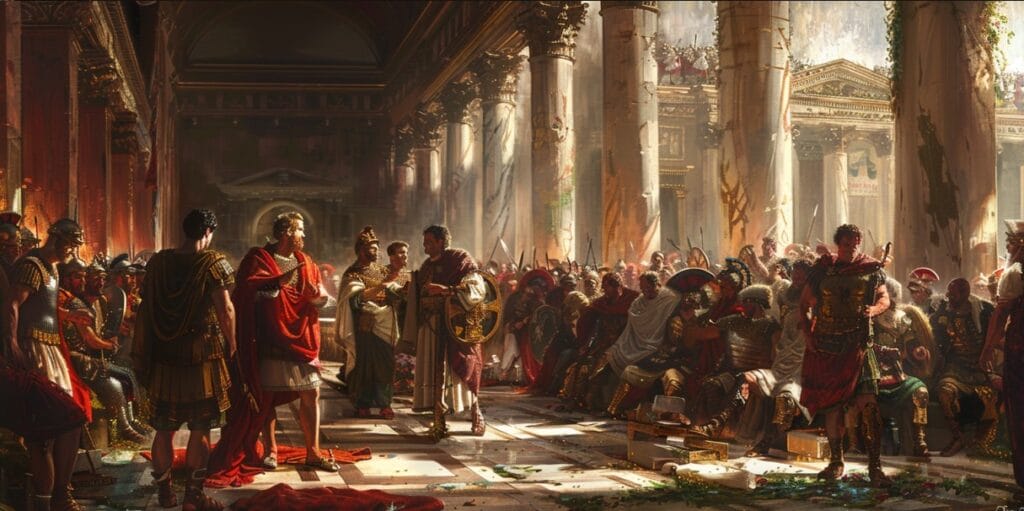
The civilization that was Rome had high demands on its people.
The Roman citizen may have enjoyed rights and had room to follow his ambitions, but so too did he have duties. These were not merely legal duties, but social ones.
He would have to live up to the expectations of the men at the head of his family. This didn’t merely apply to the Roman nobility, but so too to the simply country peasant. A man would have to prove his virtus, his worth as a man.
Whatever their social status might have been, Romans could only win the recognition and respect of their fellow Romans by doing their duty.
Where better is this shown that the origins of the census, the very registration which defined a Roman citizen, were military in nature.
For it was the virtues of the warrior which were demanded, be the citizen a soldier, an labourer or a senator. He was to have courage and intelligence and show discipline.
The privileged and high-born Roman would embark on a political career early on. For this a series of offices and posts led gradually upwards to ever more influence and prestige. All the young nobleman’s abilities and energy would be devoted to getting onto and climbing this ladder.
Private life was merely a space to rest and to find friends and build personal alliances.
And the more distinguished a citizen’s ancestry was, the more daunting the task became. Because he was expected to live up o their example. For this he would need to excel in a whole collection of skills; gaining riches, mastering law, distinguishing himself as an officer and winning followers and respect through his ability in oratory.
Nobility in Roman society was not a matter established merely by birth. Nobility could be acquired and maintained only by serving in public offices and rising to senior positions, the senior magistracies called honores. If equestrian families which had acquired sufficient wealth over time could try to enter into the struggle for such high positions in order to acquire nobility, then the pressure on the nobles to maintain their standing became ever greater.
For nobility was not only something one could acquire, but something one could also lose.
By failing to achieve high office, either by lack of effort or lack of ability, the nobleman’s family, his children, would lose their status.
Only after three successive generations achieved high office in a row, could a family be noble. And yet it took only one generation to lose this nobility again.
And so the pressure was on for each son of a senatorial family to perform and reach the highest levels of Roman society. From childhood on they were raised to compete and prove themselves the best and highest of society, the optimates.
In his late teens a senatorial son would usually serve as a tribune on the staff of a legionary commander. These commanders were usually relatives or friend’s of the family. In this role of officer in the army, the young man would face his first major tests. His discipline, courage, his ability to undergo hardships and, very importantly, his ability to withstand the temptation of foreign cultures and foreign women.
But his service in the army would also reveal if the young nobleman would be a petty tyrant, cruel and vicious to the vanquished. For ruthlessness was indeed a virtue in a Roman leader, but cruelty and brutality were seen as a weakness and lack of nobility of mind.
If military life was demanding on a young noble, then civilian life offered little respite. For just as the Roman army knew many an enemy, then so too did the powerful noble families of Rome. All feuds between different households were never forgotten. Should the father have been shamed and humiliated by the act of one family then it was upon the son to avenge this disgrace.
These contests took place in the court room. Most families power depended very often on their ability to bend the rules. Fraud, intrigue, bribery, corruption, embezzlement, even extortion, blackmail and assault. And so there was few powerful households which had no secrets to hide.
But it was by these secrets that they might be destroyed, if a young nobleman, skilled in oratory and knowledgeable in law, should drag them through the courts. More so the destruction of a powerful foe usually led to the young man, whose standing had inevitably risen in the eyes of the public, taking the very senatorial seat of the man he had just vanquished in the courts.
It was around the age of thirty that a Roman nobleman would stand a realistic chance of launching his bid on achieving high office. No doubt this was the most arduous time of his life. To build up and maintain a network of friends, supporters and voters, he would leave no stone unturned. He would shoulder enormous financial burdens (to the point of near bankruptcy if necessary), work all day long, defend his many clients in court, support them with money and spend his evenings at banquettes fulfilling his social duties of host or honoured guest. He would have to travel the rural more to visit his electors. Shaking hands, making them feel important by knowing their names and their families. Such a nobleman had to be available at all times. He would need to provide help to those who sought it, be that with money, accommodation, letters of reference to potential employers, or even by lending his horses.
Most of all, much like the tv-friendly politicians of today, the Roman nobleman had to be likeable. A generous and kind leader of the poor and a courteous and respectful elderly and his more distinguished peers.
This life would continue for all his time in office, though no doubt as his sons grew older, they would help him in his duties. But the responsibilities would only be taken from his shoulders once his sons achieved office too and he could finally retire.
Most likely he would then retire to a villa in the countryside where he would spend the later years of his life enjoying the peace and quiet he had so longed for.
Alas death would bring him an honourable funeral and he would pass on into family memory from where he would further increase the burden upon the next generations to live up to their ancestors’ example.
A great way of strengthening and enlarging one’s network of power was through marriages, either one’s own marriage or that of one’s relatives. For such wedlock would bring about alliances between families, which would then lend each other mutual support. Both practical as well as political support. Adoptions too could build such alliances.
More so, neither marriages nor adoptions ever severed the links between the children and their real families. Hence the individuals didn’t suffer while the family unit was further strengthened and empowered.
Examples of such marriages and adoptions are plenty. Scipio adopted the son of Aemilius Paullus, who then became known as Scipio Aemilianus and who would later speak of either of his two fathers with great respect and affection. The daughter of Cicero married several times, undoubtedly to build alliances for her father. Her subsequent divorces did nothing to damage the relationships between her father and his sons-in-law.

Historian Franco Cavazzi dedicated hundreds of hours of his life to creating this website, roman-empire.net as a trove of educational material on this fascinating period of history. His work has been cited in a number of textbooks on the Roman Empire and mentioned on numerous publications such as the New York Times, PBS, The Guardian, and many more.
